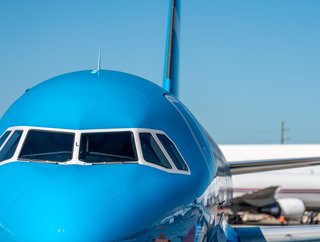SITA: Technology Making Air Travel Industry More Sustainable

As airlines and airports strive to achieve more sustainable operations, they are increasingly looking to technology to provide a next generation travel experience that is kinder to the planet.
SITA is the air transport industry’s IT provider, making more than 1,000 airports more efficient, and providing an annual assessment of technology’s role in the future of travel.
The company’s 2023 Air Transport Insights report provides a deep dive into IT spend intentions and how technology is being implemented.
“With industry ambitions to achieve net-zero CO2 emissions by 2050 in mind, airlines and airports are taking necessary steps towards reducing their carbon footprint, adopting digital tools for accurate monitoring and optimization of energy consumption and emissions,” said David Lavorel, CEO of SITA.

With sustainability front of mind, airlines are prioritising the renewal of their fleets, efficiencies around aircraft turnaround and ground operations, and a commitment to Sustainable Aviation Fuel (SAF).
Fleet Renewal
More than three quarters of airlines (77%) have renewed their fleets to more efficient, next-gen aircraft. Furthermore, the majority of airlines are optimising aircraft performance in the taxiing phase (61%) and take-off and landing (57%).
Improved Operations
By 2026, 90% of airlines plan to have IT in place to boost the efficiency of flight operations and aircraft turnaround – boosting by emerging technologies such as artificial intelligence.
Sustainable Aviation Fuel (SAF)
This report shows SAF adoption is projected to reach 83% by 2026, despite relatively low adoption so far. Half of airlines say they plan to start using the SAF book and claim system by 2026, raising adoption to 78%. More than half of airlines (54%) have introduced passenger paid offsets or SAF contribution schemes, including 92% of European airlines.
When it comes to ESG programmes and IT solutions, airports have work to do when it comes to governance, according to the report. It says 41% and 31% of airlines have adopted environmental and social initiatives, but only 21% have done so for governance).
European airlines are leading when it comes to implementing IT solutions to tackle sustainability. SITA’s report suggests 100% of European airlines have done so, compared to just 30% in the Middle East and Africa region.
Many airlines and airports are investing in ‘greening by’ tech – IT and data solutions that help achieve sustainability objectives across ESG.
These include the optimisation of flight operations via real-time collaboration tools to improve efficiency, real-time weather analysis, and flight optimisation software.
Much of this technology is optimising the passenger experience – cutting congestions and easing the faster flow of passengers through the airport.
This can be achieved at various stages of the airport journey, but primarily at check-in, bag tag, and boarding. Improvements in biometrics technology could mean airports do not need to check passports, with 70% of airlines expecting to have biometric solutions by 2026.

AI Offers Opportunities for Airlines and Airports to be More Efficient
Unsurprisingly, AI features prominently in IT planning, with CIOs looking especially at business intelligence (BI), artificial intelligence, and data sharing.
The report says BI is the biggest area of technology investment for airlines (73%) in the next three years, and that 97% of airlines and 82% of airports are investing in AI.
“As we approach a full recovery of passenger demand for air travel, with domestic travel even surpassing pre-pandemic levels in some regions, airlines and airports have learned from the congestion and disruptions seen in the past two years,” said Lavorel.
“Solutions like total airport management and BI for passenger processing provide airports and airlines real-time insight into the management of assets and passenger flow, allowing for agile, collaborative responses to any disruptions.”
At airports, building and energy management systems are a key priority, and investment in energy management systems is expected to grow moste, with more than half of airports planning this by 2026.
The SITA 2023 Air Transport IT Insights research was conducted from August to November 2023. It represents the views of over 250 senior airline and airport executives, covering a quarter of global passenger traffic.
In 2023, the Science Based Targets initiative (SBTi) approved SITA’s emission reduction targets. SITA is also developing solutions to help the industry meet its carbon reduction objectives.
READ the full report.






